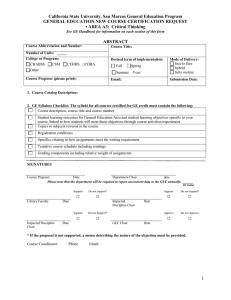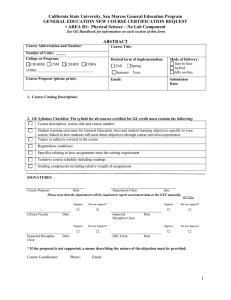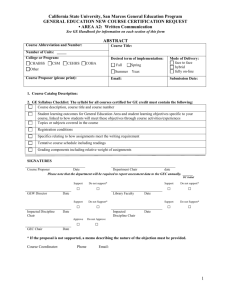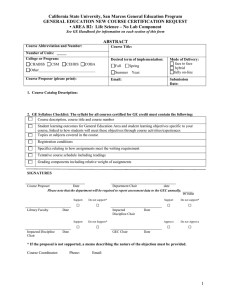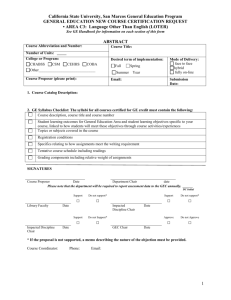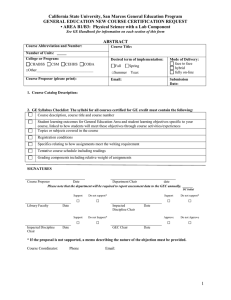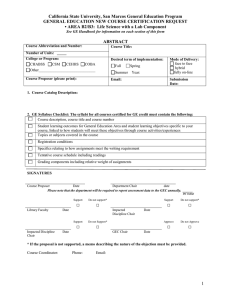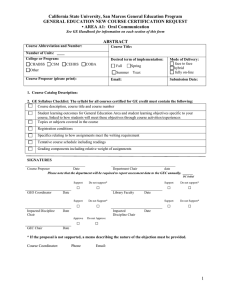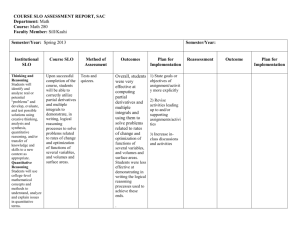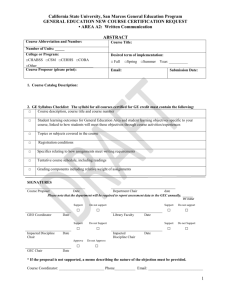Form B4 - California State University San Marcos
advertisement
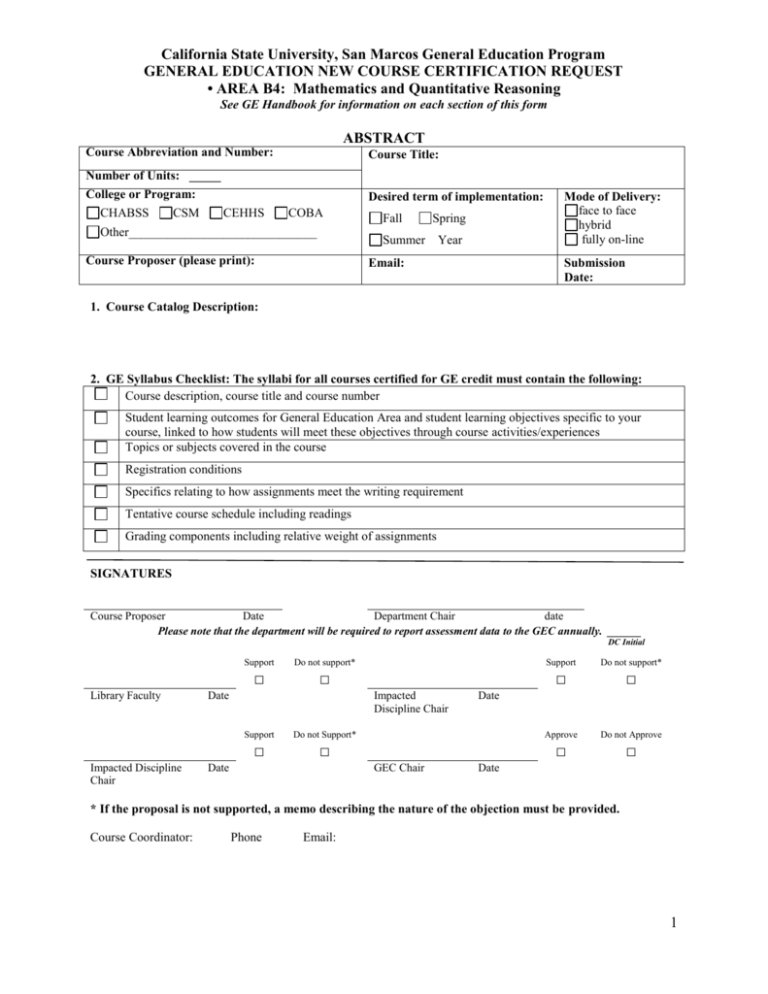
California State University, San Marcos General Education Program GENERAL EDUCATION NEW COURSE CERTIFICATION REQUEST • AREA B4: Mathematics and Quantitative Reasoning See GE Handbook for information on each section of this form ABSTRACT Course Abbreviation and Number: Course Title: Number of Units: _____ College or Program: Desired term of implementation: CHABSS CSM CEHHS COBA Other______________________________ Fall Spring Summer Course Proposer (please print): Year Email: Mode of Delivery: face to face hybrid fully on-line Submission Date: 1. Course Catalog Description: 2. GE Syllabus Checklist: The syllabi for all courses certified for GE credit must contain the following: Course description, course title and course number Student learning outcomes for General Education Area and student learning objectives specific to your course, linked to how students will meet these objectives through course activities/experiences Topics or subjects covered in the course Registration conditions Specifics relating to how assignments meet the writing requirement Tentative course schedule including readings Grading components including relative weight of assignments SIGNATURES Course Proposer Date Department Chair date Please note that the department will be required to report assessment data to the GEC annually. ______ DC Initial Library Faculty Impacted Discipline Chair Support Do not support* □ □ Date Impacted Discipline Chair Support Do not support* □ □ Date Support Do not Support* Approve Do not Approve □ □ □ □ Date GEC Chair Date * If the proposal is not supported, a memo describing the nature of the objection must be provided. Course Coordinator: Phone Email: 1 California State University, San Marcos General Education Program GENERAL EDUCATION NEW COURSE CERTIFICATION REQUEST • AREA B4: Mathematics and Quantitative Reasoning See GE Handbook for information on each section of this form Part A: B4 Quantitative Reasoning General Education Learning Outcomes (GELOs) related to course content. [Please type responses into the tables.] Math/Quant Reasoning GELOs this course will address: B4.1: Explain and apply a variety of fundamental mathematical concepts, symbols, computations and principles. B4.2: Determine which quantitative or symbolic reasoning methods are appropriate for solving a given problem and correctly implement those methods. Course content that addresses each GELO. How will these GELOs be assessed? Part B: General Education Learning Outcomes required of all GE courses related to course content: GE Outcomes required of all Courses Students will communicate effectively in writing to various audiences. (writing) Students will think critically and analytically about an issue, idea or problem. (critical thinking) Course content that addresses each GE outcome? How will these GELOs be assessed? Part C: GE Programmatic Goals: The GE program aligns with CSUSM specific and LEAP Goals. All B4 courses must meet at least one of the LEAP Goals. GE Programmatic Goals LEAP 1: Knowledge of Human Cultures and the Physical and Natural World. LEAP 2: Intellectual and Practical Skills LEAP 3: Personal and Social Responsibility LEAP 4: Integrative Learning CSUSM Specific Programmatic Goals CSUSM 1: Exposure to and critical thinking about issues of diversity. CSUSM 2: Exposure to and critical thinking about the interrelatedness of peoples in local, national, and global contexts. Course addresses this LEAP Goal: No Yes No Yes No Yes No Yes Course content that addresses the following CSUSM goals. Please explain, if applicable. No Yes (please describe): No Yes (please describe): 2 California State University, San Marcos General Education Program GENERAL EDUCATION NEW COURSE CERTIFICATION REQUEST • AREA B4: Mathematics and Quantitative Reasoning See GE Handbook for information on each section of this form Part D: Course requirements to be met by the instructor. Course Requirements: Course meets the All-University Writing requirement: A minimum of 2500 words of writing shall be required for 3+ unit courses. All courses offered in area B4 must have a prerequisite of at least intermediate algebra and must use a level of mathematics beyond that of intermediate algebra. No remedial algebra courses (e.g., Math 10, 20, and 30) can be used to satisfy this requirement. Even if a course has intermediate algebra as a prerequisite, it will not satisfy the Quantitative Reasoning Requirement unless it also meets each of the following three conditions: It must focus on the use of mathematical language and formal reasoning in a variety of diverse disciplines, using a broad range of examples. It must provide some historical perspective on the role which this approach has played in the development of human knowledge and of our understanding of the world. It must demonstrate a variety of methods, such as the use of abstract symbols, of numeric techniques, of logical reasoning, of geometry, etc. A statistics component may be included which must: Develop the students' ability to comprehend the power and broad utility of the fundamental mathematical models presented, rather than merely teaching rote statistical skills; and Must indicate applications to several areas. A computer science component may be included which must: Teach a computer language that is suitable for use in diverse areas; Teach this language in such a way that the student is led to a fundamental understanding of the nature of problem solving by combining data structures with algorithms; and Provide fundamental skills in the use of computers for the application of university level quantitative methods to the solution of problems in many diverse areas. How will this requirement be met by the instructor? 3
